The 100th anniversary of the First World War is now finished but the records will continue to be preserved at the Archives and accessible to current and future generations who want to know more about the time period. In addition, this blog will remain on our website as an additional resource.
August 2018 Posts:
- 27 August: A Soldier's Belongings: the Arthur Rufus Morrison Wallet
- 20 August: Wounded while flying over France
- 13 August: Russian Revolution and HBC: Allied Troops take Archangel
- 7 August: The view from London, August 1918
27 August 2018
A Soldier’s Belongings: the Arthur Rufus Morrison Wallet
Over 60,000 Canadian soldiers lost their lives in the First World War. One of them was Arthur Rufus Morrison. He served with the Canadian Machine Gun Corps from April 1, 1917, until his death on September 29, 1918.
The Archives of Manitoba houses several records belonging to Morrison from his time in the First World War. One of these items is a wallet, which contains a mirror, diary, and a pay book.
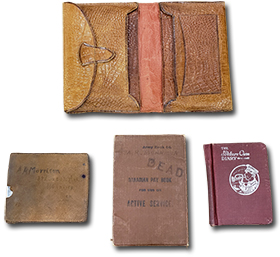
(3 images)
Note: there were also photographs inside the wallet, but they were removed and placed into folders to properly preserve them.
The diary and pay book are of particular interest in this collection. The diary starts when Morrison enlisted on February 27, 1917, and ends on September 26, 1918.
His last entry reads:
“Nights getting quite cold. On duty as runner for 87, headquarters.”
Runners relayed information between soldiers and commanders when radios were not available. The rest of the diary is empty as Morrison was killed in action three days later on September 29th.
The pay book contains a list of payments Morrison received while serving in France. It also lists the date he was killed and has the word “DEAD” stamped on the front cover.
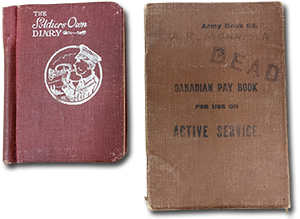
Due to the wallet’s good condition, it is unclear if it was removed from Morrison’s body after his death or if he entrusted it to another soldier before he was killed. In either case, the military made sure it was kept in good condition while being transported to Morrison’s family. His relatives took care of the wallet before donating it to the Archives of Manitoba as part of the records of Norman Alexander Matheson.
Search Tip: Search “Norman Matheson” in Keystone to find a description and listing of these records.
Feedback
E-mail us at archiveswebmaster@gov.mb.ca with a comment about this blog post. Your comments may be included on this page.
20 August 2018
Wounded while flying over France
James Uhlman wrote brief daily entries in a small notebook which document his First World War Service from the time he enlisted in May 1916 until 31 December 1918. Our first blog about Uhlman in January 2018 describes how he transferred to the Royal Flying Corps after recovering from wounds he sustained at Vimy Ridge in 1917. He completed his flight training in early summer of 1918 and was sent to serve with a Royal Flying Corps squadron in France.
While on a bombing run in August, Uhlman’s airplane was attacked by German airplanes. Uhlman and the observer who was flying with him were both wounded, but Uhlman managed to land his damaged plane behind the French lines.

Uhlman describes the incident and his subsequent recovery in his diary:
Aug 13. Up at 5 but didn’t start till 1 P.M. Engine dead so couldn’t keep up. Left formation about 25 miles over lines. Dropped bomb.
Attacked by 5 Huns in return. Controls partially shot away & observer wounded 4 times. Got hit once. Landed behind French lines at Verdun. Got dressing station. Later in ambulance to Somilly. Operated on same night. Was sick coming out of ether. Didn’t sleep much.
Aug 14. Restless. Lost lot of blood. Head wound dressed. In P. M. American captain was in also English-speaking nurse. Good appetite. Didn’t sleep well.
Aug 15. Read most of day. Capt. Stemp came in P. M. & I wrote some letters. Slept much better.
Aug. 16. Wound dressed. Hurt a lot then & all day. Capt. Stoup in again. Read most all day.
Aug. 17. Slept fair. Read most of day. Baronne de Baye & daughter came in P. M. Very nice.
Aug. 18. Slept fine. Two fellows came from squadron. Very glad to see them. Brought some letters & things. Baronne de Baye came again at night.
Aug. 19. Wrote letters & read all day. Slept well.
Aug. 20. Ditto.
Aug. 21. High fever & slept very badly. Very hot day too.
Aug 22. Slept much better. Out doors in P. M. Very nice too. Got some more mail.
Aug. 23. Slept very well. Out door again. Read most all day.
Aug. 24. Slept & read.
Aug. 25. Slept well. Stomach bad.
Uhlman recovered from his wounds and returned to flying. Following the war he became a pilot with Civil Air Operations of the Royal Canadian Air Force. He was appointed first director of the resulting Manitoba Government Air Service based in Lac du Bonnet, Manitoba in 1932 and held the position until his retirement in 1962. Our 2 June 2018 blog features a photograph of Uhlman and other Manitoba Government Air Service staff in 1932.
Uhlman is one of several individuals featured in our hallway display. Visit the Archives of Manitoba to see this display or to see other records related to the First World War. We are located at 200 Vaughan Street in Winnipeg, and we are open Monday to Friday from 9 a.m. to 4 p.m.
Search Tip: Search James Uhlman in Keystone for more information about the records.
Feedback
E-mail us at archiveswebmaster@gov.mb.ca with a comment about this blog post. Your comments may be included on this page.
13 August 2018
Russian Revolution and HBC: Allied Troops take Archangel
In our July 23 blog, we talked about a July 25, 1918 letter written by C.J.R. Small, HBC’s agent in Archangel (or Arkhangelsk), Russia. In it, he expressed concern that all Allied subjects would be required to leave Russia on short notice, after the execution of Russia’s Imperial family and the subsequent expulsion of Bolshevik forces from Yekaterinburg. In that letter, Small included an inventory of all HBC possessions.
The next letter Small wrote to the Governor and Committee is dated August 14. He writes:
Referring to our letter No. 538, we are glad to inform you that it was after all not necessary for us to leave Archangel, owing to the fact that the Allied troops arrived unexpectedly, and the Bolsheviks had their time fully occupied in stripping the town of all foodstuffs and valuables and hurriedly clearing out to Vologda. Prior to the arrival of the Allies, however, there was a grave danger of the arrest and internment of all allied subjects; - in fact, the Consuls were actually arrested, but released the next day by the counter-revolutionary party.
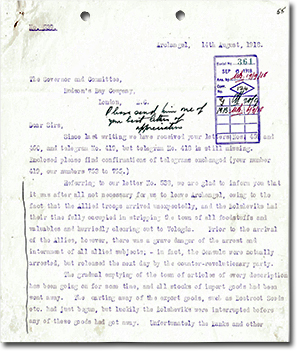
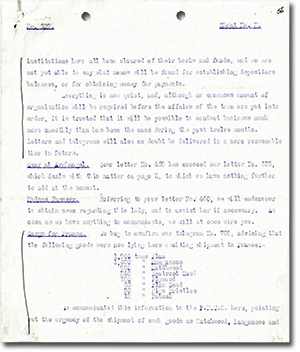
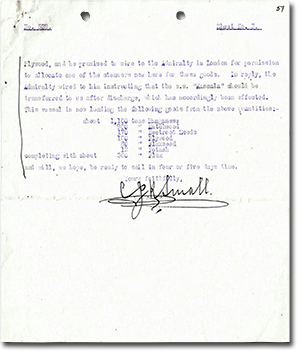
On August 2, 1918, Russia’s White Army and Allied forces moved into Archangel and staged a coup against the Soviet government there. This was the first event in what was known as the North Russian Intervention (also known as the Archangel Campaign), in which foreign troops, including Canadians, became involved in the Russian Revolution to aide the White Army.
These events were a relief for HBC and its business. Small is cautiously optimistic about HBC’s future operations in Archangel:
The carting away of the export goods, such as Beetroot Seeds etc. had just begun, but luckily the Bolsheviks were interrupted before any of these goods had got away. Unfortunately the Banks and other institutions have all been cleared of their books and funds, and we are not yet able to say what means will be found for establishing depositors balances, or for obtaining money for payments.
He goes on:
Everything is now quiet, and, although an enormous amount of organization will be required before the affairs of the town are put into order, it is trusted that it will be possible to conduct business much more smoothly than has been the case during the past twelve months.
Allied support in Archangel continued until 1919, when troops began to withdraw from the region. Ultimately, the White Russian army fell to the Bolshevik troops and, on February 20, 1919, the Bolsheviks once again had control of Archangel.
Search Tip: Search “Archangel” in Keystone to find more records.
Feedback
E-mail us at archiveswebmaster@gov.mb.ca with a comment about this blog post. Your comments may be included on this page.
7 August 2018
The view from London, August 1918
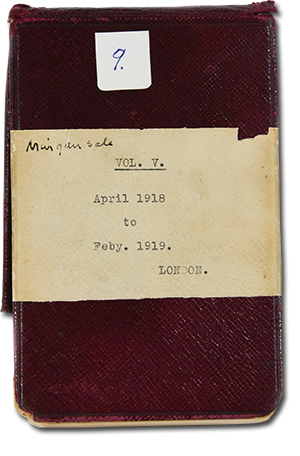
Robert Maxwell Dennistoun’s diaries have been featured in earlier blogs (8 August 2017, 14 August 2017, 2 January 2018 and 26 March 2018 ). Dennistoun was Deputy Judge Advocate General at Canadian Expeditionary Force headquarters in London from 1917 until the end of the war and kept a diary recording his experiences of wartime in London and news about the Front.
In August 1918, Dennistoun documented the entry of the Canadian forces in the intense fighting:
“Canadians now in for first time this summer. They have been held in reserve as ‘the finest, best-trained and best-disciplined Corps in France’ as I was told by General Burnett Stuart from G. H. Q.”
On Monday, 12 August, he recorded:
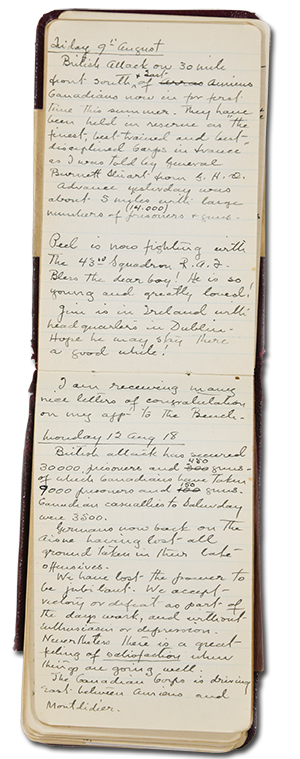
“British attack has secured 30,000 prisoners and 300 450 guns – of which Canadians have taken 9000 prisoners and 100 150 guns. Canadian casualties to Saturday were 3500.
Germans now back on the Aisne having lost all ground taken in their late offensives.”
It sounded like good news for the British and Canadians, but Dennistoun noted:
“We have lost the power to be jubilant. We accept victory or defeat as part of the day’s work, and without enthusiasm or depression.
Nevertheless there is a great feeling of satisfaction when things are going well.”
Dennistoun also wrote about his sons’ current postings and noted that he had received many congratulatory letters on his appointment to the bench. Dennistoun was appointed judge for the Manitoba Court of Appeal in 1918, but did not take up this position until he completed his military service and returned to Manitoba in 1919. Dennistoun was a Court of Appeal judge for 28 years, retiring in 1946.
Search Tip: Search “Dennistoun” in Keystone to learn more about these records.
Feedback
E-mail us at archiveswebmaster@gov.mb.ca with a comment about this blog post. Your comments may be included on this page.



